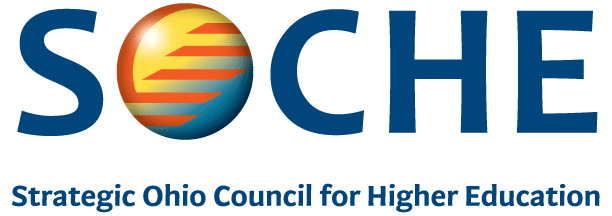SOUTHWEST OHIO (December 6, 2017) — SOCHE, the Southwestern Ohio Council for Higher Education, released its Economic Impact Study today, which reveals how southwest Ohio’s regional economy has benefitted from area colleges and universities. The study assesses spending by SOCHE’s members in their respective operations and capital expansions, as well as through research funding, donations, and additional spending by outside visitors and students. The Economic Impact Study included 22 colleges and universities, affecting a twenty-county footprint and was conducted for SOCHE by the University of Cincinnati’s Economic Center. The full study can be found at here.
The total economic impact of SOCHE’s member institutions was $7.3 billion in the fiscal year 2016. Every dollar spent by SOCHE’s members brought approximately $.72 in additional economic activity, and for every two jobs in higher education, there was one indirect job created. This activity has a significant and cumulative impact on the economic health of southwestern Ohio.
“The collective economic impact of SOCHE’s members is not only measured in jobs, wages, and economic activity,” said Sean Creighton, president of SOCHE. “Higher education institutions also provide research, consultancy, and services that support local, regional, and national businesses. Area colleges and universities impact the social and cultural environments of their respective communities. Equally important, SOCHE’s member institutions are building the single greatest resource for our economy: human capital—talented, trained, engaged individuals,” Creighton emphasized.
In fact, the SOCHE report indicates nearly 150,000 students are studying and living in the region. Furthermore, student tuition, research dollars, and alumni giving bring $3.8 billion in new revenue to the region.
“SOCHE’s impact study reinforces the role of higher education as a regional economic driver,” explained Jo Alice Blondin, president of Clark State Community College and chair of the SOCHE Board of Trustees. “Through changing times and economic climates, our two- and four-year institutions have continued to provide the quality training and education needed for individuals to better themselves, their careers, and their lives. Through internships, capstones, and other immersive work experiences, our students are connecting with in-demand industries and employers to advance our regional economy,” Blondin added.
Higher education continues to serve as one of the region’s most valuable assets, increasingly focused on supporting regional industry, graduating more students into the workforce, and engaging students in public service and community welfare. Increasing the number and retention of students who earn post-secondary degrees and certificates has a significant impact on many aspects of our local economy. Building an educated and engaged workforce continues to generate economic dividends well into the future, further illustrating the importance of our regional higher education institutions. According to the report, SOCHE’s member colleges and universities awarded 31,643 degrees and certificates in 2016, helping raise the educational attainment levels of the state and meet the demand for higher paying jobs that require college degrees and certificates.
“Higher education continues to support our globally competitive key industries, including Aerospace and Defense, Human Sciences and Health Care, IT and Advanced Data Management, and Advanced Materials and Manufacturing,” said Representative Rick Perales who chairs the Finance Higher Education Subcommittee. “Not only does SOCHE—higher education—support these industries which are the foundation of our economy, but higher education is vital in its own right,” Representative Perales added.


